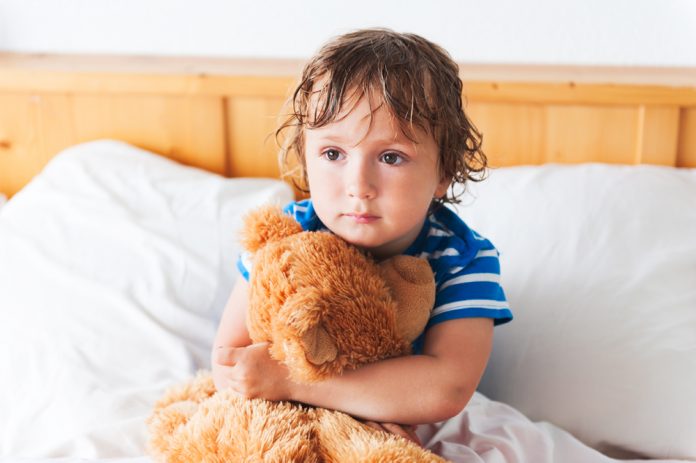This post is also available in: English हिन्दी (Hindi) বাংলা (Bengali)
Is it normal for my child to wet the bed at night?
Yes, it can be normal. Wetting the bed at night is common in young children. By age 4, most children can control their bladder when they are awake. But it can take longer for children to have control over their bladder when they are sleeping. Some children do not stop wetting the bed at night until they are 5 to 7 years old. Bedwetting is more common in boys than in girls, and can run in families.
Most children will stop bedwetting on their own and do not need any treatment. But if you are worried or have questions about your child’s bedwetting, talk with your child’s pediatrician.

Why do children wet the bed?
Most of the time, bedwetting is not caused by a medical or emotional problem. In some cases, though, it is. Your doctor should be able to tell if your child’s bedwetting is caused by a medical problem.
What can I do to try to stop my child’s bedwetting?
You can try different things at home to stop your child’s bedwetting:
- Have your child urinate before going to bed. Remind him or her to wake up and use the toilet when needed.
- Put night lights in the hall and bathroom so your child can find the toilet easily.
- Stop using diapers or training pants at home, especially if your child is older than 5. Your child can still wear those items for overnight visits with family and friends.
- Have your child help with clean up in the morning. For example, he or she can take the wet sheet off the bed or help with laundry.
- Keep a chart of your child’s progress and give rewards when your child stays dry. You and your child should agree on the rewards ahead of time.
- Spread out your child’s drinks over the whole day. Do not have your child drink a lot right before bedtime. Avoid sugary and caffeine-containing drinks, especially in the evening
- Help your child teach his or her bladder to hold more urine. Have your child hold his or her urine for longer periods of time before urinating.
- Use a night-time bedwetting alarm. These have special sensors that set off an alarm when the child wets the bed. They work best in children ages 7 and older.
For any of these plans to work, both you and your child must want the bedwetting to stop. Stopping bedwetting can be very hard to do and can take a long time.
Treatment is often prolonged and may involve cycles of success and failure. Treatment should include consistent follow-up with a clinician.
Remember that children cannot help their bedwetting. You should never get mad at, punish, or tease your child for wetting the bed.
When should I see a doctor or nurse?
You should see your doctor if your child
- Feels the need to urinate more than usual
- Is more thirsty than usual
- Has a burning feeling when he or she urinates
- Has swelling of the feet or ankles
- Starts wetting the bed again after being dry for weeks or months
These symptoms can be a sign of a medical problem. The doctor will examine your child and might order tests, including a urine test.
Medical problems that may contribute to bedwetting include diabetes, urinary tract infection, constipation, pin worms, kidney failure, seizures, and sleep problems (such as sleep apnea). Most of these conditions can be diagnosed easily.
It is also useful to record a 24-hour diary of how much the child drinks and how much urine he or she passes.
Are there medicines that can reduce bedwetting? Yes. There are medicines doctors can prescribe to reduce bedwetting. But medicines are usually given to children older than 7 who have already tried many other ways to stop bedwetting. It is generally recommended for brief periods (eg, overnight camps or sleepovers), although in exceptional cases, it can be used on a nightly basis for short periods. However, risk of side effects and relapse make medicines an unfavourable option.

Bedwetting education and advice
- Bedwetting is common before the age of 5 years.
- Bedwetting goes away on its own in most children.
- Protect the child’s mattress with a waterproof sheet to avoid urine odour.
# Bedwetting is not the child’s fault; children should not be punished for bedwetting.
# Do not tease or allow siblings to tease a child who has wet the bed.
By
Dr. Shreya Sharma
Dr. Shreya Sharma is a childcare expert and an M. D. in Pediatrics, she is currently a Pediatrician with fellowship in Pediatric Endocrinology, Mumbai.

This post is also available in: English हिन्दी (Hindi) বাংলা (Bengali)










